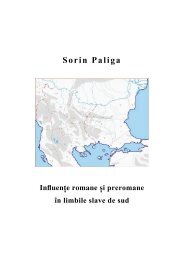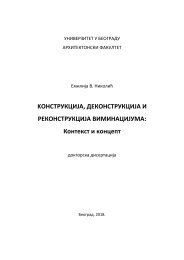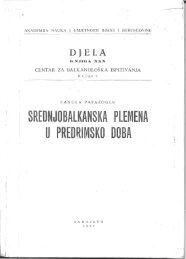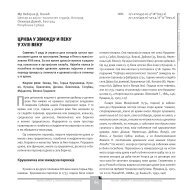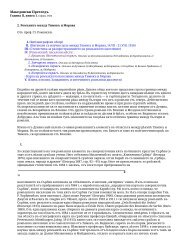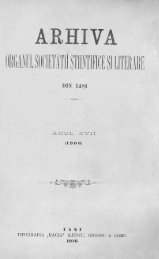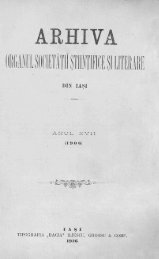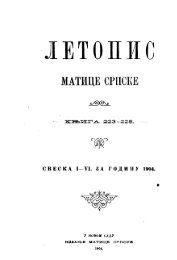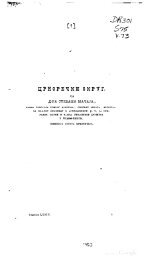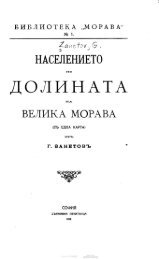The Construction of National Identity and its Challenges in Post-Yugoslav Censuses
Create successful ePaper yourself
Turn your PDF publications into a flip-book with our unique Google optimized e-Paper software.
888 Social Science Quarterly<br />
city <strong>of</strong> Vukovar, for example, the number <strong>of</strong> Serbs determ<strong>in</strong>ed the use <strong>of</strong> Cyrillic for local<br />
use (Vesti, 2012). In Macedonia, at the state <strong>and</strong> the municipal level, the threshold <strong>of</strong> 20<br />
percent guarantees far-reach<strong>in</strong>g rights, <strong>in</strong>clud<strong>in</strong>g <strong>of</strong>ficial use <strong>of</strong> the m<strong>in</strong>ority language <strong>and</strong><br />
special veto rights among others.<br />
In other cases, the entitlements might not be legally b<strong>in</strong>d<strong>in</strong>g, but numerical strength is<br />
crucial for mak<strong>in</strong>g claims <strong>and</strong> symbolic entitlement. <strong>The</strong> ma<strong>in</strong> dist<strong>in</strong>ction that numbers<br />
provide is between be<strong>in</strong>g a m<strong>in</strong>ority <strong>and</strong> hold<strong>in</strong>g a claim to co-ownership <strong>of</strong> the state.<br />
For example, the dem<strong>and</strong>s <strong>of</strong> Serb political parties <strong>in</strong> Montenegro to have Serb identity<br />
recognized as constituent people equal to Montenegr<strong>in</strong>s, or the fear <strong>of</strong> Croat parties <strong>and</strong><br />
groups <strong>in</strong> Bosnia that the status <strong>of</strong> Croats as constituent people might be endangered by<br />
low numbers.<br />
F<strong>in</strong>ally, the group size provides for political capital <strong>and</strong> legitimacy to parties <strong>and</strong> organizations<br />
claim<strong>in</strong>g to represent these groups. For example, <strong>in</strong> Bosnia a large number<br />
Bosnians would underm<strong>in</strong>e the claims <strong>of</strong> ethno-nationalist parties to be the only legitimate<br />
representatives <strong>of</strong> the different communities.<br />
With the significance <strong>of</strong> census results established, we can turn to the strategies <strong>of</strong> ethnic<br />
entrepreneurs at censuses. In addition to shap<strong>in</strong>g the categories, as noted above, the ma<strong>in</strong><br />
activity <strong>of</strong> these ethnic entrepreneurs has been threefold: challeng<strong>in</strong>g censuses, mobiliz<strong>in</strong>g<br />
their constituencies, <strong>and</strong> seek<strong>in</strong>g to broaden their base.<br />
Contestation<br />
<strong>The</strong> threat <strong>of</strong> boycott <strong>and</strong> challeng<strong>in</strong>g the census process has been a frequent strategy<br />
employed by ethnic entrepreneurs. As noted earlier, Albanians <strong>in</strong> Kosovo boycotted the<br />
1991 <strong>Yugoslav</strong> census. Serbs, <strong>in</strong> turn, largely boycotted the Kosovo census <strong>in</strong> 2011. As a<br />
result, the last reliable census for Kosovo dates back to 1981. In their recent article, Visoka<br />
<strong>and</strong> Gjevori (2013) have argued that censuses <strong>in</strong> Southeastern Europe experience four<br />
levels <strong>of</strong> contestation: marg<strong>in</strong>al, partial, extensive, <strong>and</strong> full. Marg<strong>in</strong>al contestation implies<br />
few challenges by organized groups. A partially contested census is challenged by at least<br />
one m<strong>in</strong>ority group. A significant boycott <strong>of</strong> the census by an important m<strong>in</strong>ority could<br />
be considered an extensive contestation. A fully contested census means that the census is<br />
ab<strong>and</strong>oned due to strong resistance. <strong>The</strong> four-pronged categorization allows the authors<br />
to characterize the 2011 censuses <strong>in</strong> Serbia <strong>and</strong> Montenegro as marg<strong>in</strong>ally contested, the<br />
census <strong>in</strong> Albania as partially contested, the census <strong>in</strong> Kosovo as extensively contested, <strong>and</strong><br />
the Macedonian census fully contested.<br />
However, contestation <strong>its</strong>elf can be controversial <strong>and</strong> contested. M<strong>in</strong>orities are rarely<br />
monolithic actors, <strong>and</strong> outside the context <strong>of</strong> authoritarian repression (as dur<strong>in</strong>g the 1990s<br />
<strong>in</strong> Serbia), the motives for boycotts are not always accepted. For example, <strong>in</strong> S<strong>and</strong>žak,<br />
Muamer Zukorlić, an <strong>in</strong>fluential leader <strong>of</strong> the Islamic community, called on Bosniaks to<br />
boycott the census. Two key parties <strong>of</strong> Bosniaks, both <strong>in</strong> the Serbian government at the<br />
time, supported the census (Radio Slobodna Evropa, 2011). Similarly <strong>in</strong> Kosovo, Serbs<br />
<strong>in</strong> the north followed the call <strong>of</strong> the Serbian government to boycot the count, whereas<br />
some Serbs <strong>in</strong> central Kosovo followed the advice <strong>of</strong> the Serb Independent Liberal Party,<br />
which was represented <strong>in</strong> the Kosovo government, to participate (Barlovac, 2011). <strong>The</strong><br />
contestation with<strong>in</strong> m<strong>in</strong>ority communities sheds light on the fact that censuses are not<br />
just controversial between m<strong>in</strong>orities <strong>and</strong> the state, but especially today, as m<strong>in</strong>ority parties<br />
regularly participate <strong>in</strong> government <strong>in</strong> Southeastern Europe, differences also emerge with<strong>in</strong><br />
m<strong>in</strong>ority groups.






